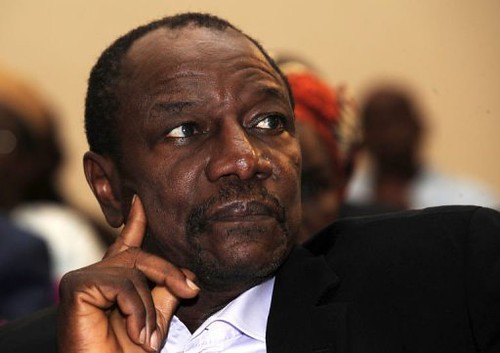
Guinea-Conakry's newly-elected President Alpha Conde won the office in a run-off election. The West African state is rich in mineral resources including bauxite and diamonds., a photo by Pan-African News Wire File Photos on Flickr.
Guinea's legislative election postponed to September 28: mediator
5:47pm EDT
By David Lewis and Saliou Samb
CONAKRY (Reuters) - Guinea's long-delayed legislative election scheduled for Tuesday has been postponed by four days to September 28 following talks between the opposition and government on Saturday in Conakry, a U.N. mediator said.
Guinea's main opposition leader had threatened to call supporters into the streets if authorities pushed ahead with the election without fully addressing complaints over preparations. He said he was satisfied with the delay announced on Saturday.
The poll, meant to cap Guinea's transition back to civilian rule, has been delayed repeatedly since President Alpha Conde was elected three years ago, sowing doubts among Guineans, investors and donors over political progress in the world's top bauxite exporter.
Said Djinnit, the U.N. mediator charged with ending a political deadlock in a country that is prone to violent street protests, said all parties had agreed to the delay to let the electoral commission fine-tune its plans.
"We are convinced that with this agreement, nothing can hinder the holding of parliamentary elections under free, transparent, and inclusive conditions on Saturday, September 28, 2013 in Guinea and abroad," Djinnit said.
The opposition has complained that the voter list is riddled with errors, meaning many of its supporters have been left off while people elsewhere in the country have been registered several times over.
It also complains that polling stations in opposition strongholds have been scattered far apart, meaning voters would have to travel far and therefore be less likely to vote.
Cellou Dalein Diallo, the main opposition leader, said he had wanted a longer delay to fix the problems but had agreed to the compromise of Sept 28.
"For the credibility of the agreement (reached between the political parties), it was important to have a further delay," he said.
Dozens of people have been killed in protests over the election preparations this year.
Election experts say the delay will allow organizers to address some of the issues, but a fundamental lack of trust between the two sides and the election commission, which is seen as pro-Conde, means tensions are likely to simmer.
The West African nation's economic growth forecast has been slashed to 2.9 percent for this year, down from 4.5 percent, because of the protests and political paralysis.
The unrest and a review of contracts led to major mining firms - looking to tap into Guinea's iron ore reserves, seen as some of the world's largest - stalling planned projects.
(Writing by David Lewis and Bate Felix; Editing by Peter Cooney)
No comments:
Post a Comment